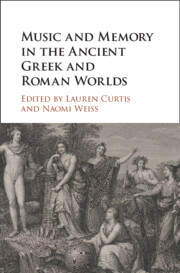
-
Select format
-
- Publisher:
- Cambridge University Press
- Publication date:
- October 2021
- October 2021
- ISBN:
- 9781108917858
- 9781108831666
- 9781108926959
- Dimensions:
- (229 x 152 mm)
- Weight & Pages:
- 0.67kg, 380 Pages
- Dimensions:
- (229 x 152 mm)
- Weight & Pages:
- 0.614kg, 380 Pages
You may already have access via personal or institutional login
Book description
In Greek mythology, the Muses are Memory's daughters. Their genealogy suggests a deep connection between music and memory in Graeco-Roman culture, but how was this connection understood and experienced by ancient authors, artists, performers, and audiences? How is music remembered and how does it memorialize in a world before recording technology, where sound accumulated differently than it does today? This volume explores music's role in the discourses of cultural memory, communication, and commemoration in ancient Greek and Roman societies. It reveals the many and varied ways in which musical memory formed a fundamental part of social, cultural, ritual, and political life in ancient Greek- and Latin-speaking communities, from classical Athens to Ptolemaic Alexandria and ancient Rome. Drawing on the contributors' interdisciplinary expertise in art history, philology, performance studies, history, and ethnomusicology, eleven original chapters and the editors' Introduction offer new approaches for the study of Graeco-Roman music and musical culture.
Contents
Metrics
Altmetric attention score
Full text views
Full text views help Loading metrics...
Loading metrics...
* Views captured on Cambridge Core between #date#. This data will be updated every 24 hours.
Usage data cannot currently be displayed.
Accessibility standard: Unknown
Why this information is here
This section outlines the accessibility features of this content - including support for screen readers, full keyboard navigation and high-contrast display options. This may not be relevant for you.
Accessibility Information
Accessibility compliance for the PDF of this book is currently unknown and may be updated in the future.


